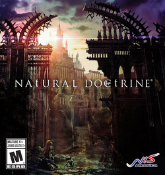Natural Doctrine Review
|
|
See PixlBit's Review Policies

On 10/16/2014 at 12:30 PM by Matt Snee Almost enough to make one quit video games entirely. |

For tactical RPG fans who enjoy new riffs on the genre, and don't mind playing through levels repeatedly as they struggle to find the correct strategy.
This was it: I had played the level six times already, and I knew I finally had it. Each prior attempt had employed a different, individual strategy, and they all had failed. But I had edged closer and closer to success. Now was the moment of truth: I instructed my units to move to the next space -- but the game suddenly froze! I pressed every button I could, hoping in vain to bring it back to life. I was the victim of a game-breaking bug. Angry and frustrated, I grudgingly reset the game. Oh and did I mention it was only the third level, and the difficulty was set on easy?
The premise of the game is simple: move around on a world map where little anime dialogues dictate the story, and transition into battle zones where the meat of the game takes place. Instead of an isometric world like most tactical RPGs, the levels are fully 3D, and you can rotate the camera around to better see the environment. This sounds better in theory than it actually works; in reality it is awash in frustrating camera moments. When the action is outside, it's mostly okay. But often you'll be in a dungeon or some other sort of structure where it becomes difficult to evaluate your position amidst the walls. Secondly, the view is based on the character you've selected, which makes sense in theory, but ultimately is a little disorienting as you toggle through them.
In battle, you have control of a set of soldiers with various powers: the close combat warrior, the gun-toting marksman, the wizard/healer, etc. Each character has different skills, feats, and advantages and disadvantages. It sounds typical, but there are lots of different talents and powers, all with different mechanics.
Close combat actually is less dangerous than ranged attacks. The latter are where you'll usually get killed by your enemies, as it's hard to calculate where they'll move to and if they will be close enough to attack you. With the number of enemies in the levels, this gets difficult to parse. You have to imagine the possibilities of your enemy to an almost chess-like level, and while this might sound fun to some, it can also be very unpredictable and annoying.
The key to the combat of Natural Doctrine is that characters can collaborate with each other in their actions by "linking" to achieve more power and compound the damage they can inflict. The more linking that goes on, the more one prospers in battle.
I never quite got a complete handle on this. Certain combinations will allow more damage, or multiply attacks, but others will change your turn position and open up unforeseeable dangers and advantages. This is obviously the key to the game, but there's never a full tutorial to explain it. This is true of both the playable characters and enemies, though the opposing force is often much larger, and capable of linking powers for an unfair advantage.
I have found tactical RPGs in the past to be tough but fair. Usually if you fail you can rearrange your strategy, or at least grind until you can overcome the obstacle. Natural Doctrine, on the other hand, is punitive in its difficulty and unbalanced, with no way to efficiently grind to gain that little bit of extra power needed to succeed. You'll come up with strategy after strategy, but each one will fail after playing a board for twenty or thirty minutes, only to lose and have to start over again. This happens over and over.
If any of the player's characters die, it's game over. It is this more than any other flaw that ruined the experience for me. I would have had a much better time with a more forgiving penalty for characters falling on the battlefield. Instead, the squad is only as strong as its weakest soldier. On the other side of the conflict, victory only comes when every enemy has been defeated, which is far from fair. Had the game been more balanced, it wouldn't be such a problem. Unfortunately, one small slip up and it's game over--again and again.
The problem with it isn't that it's unoriginal. It's got plenty of neat ideas and it's actually quite fun when it works right. It's just so unrefined to the point that it's unplayable. It seems like not one of the developers actually played the game from start to finish. Insane difficulty spikes are coupled with bland characters and lackluster storytelling, two things that normally stand out in tactical RPGs. The game is forgettable except for its infuriating nature. Complexity without any explanation can be a killer, and I really can’t recommend it unless you consider yourself to be the hardest of the hardcore. And I can't tell if the game is broken, or if I just don't understand it enough -- but how would I learn? The game has no interest in imparting its secret truths, and would rather just punish you, over and over.









Comments